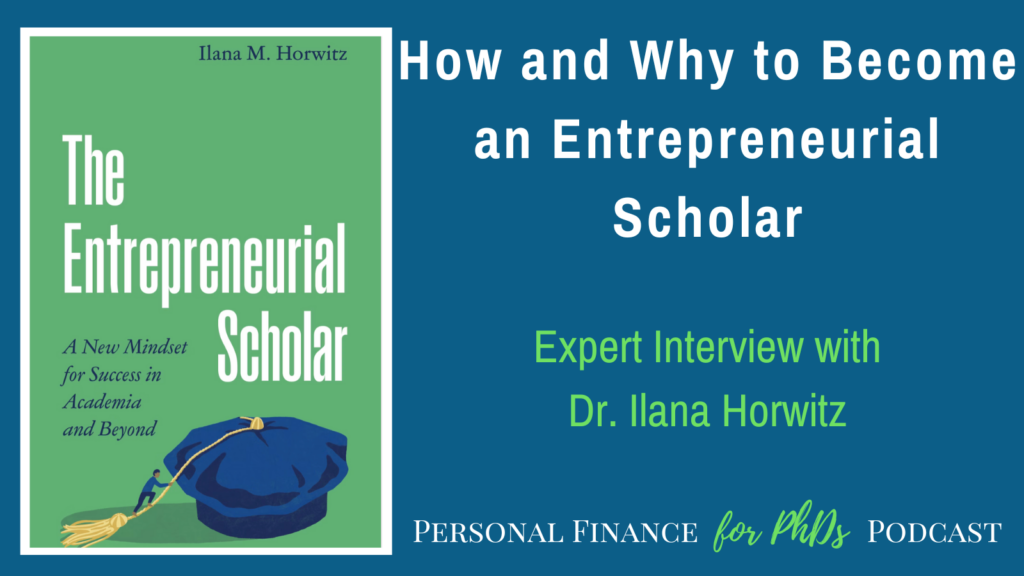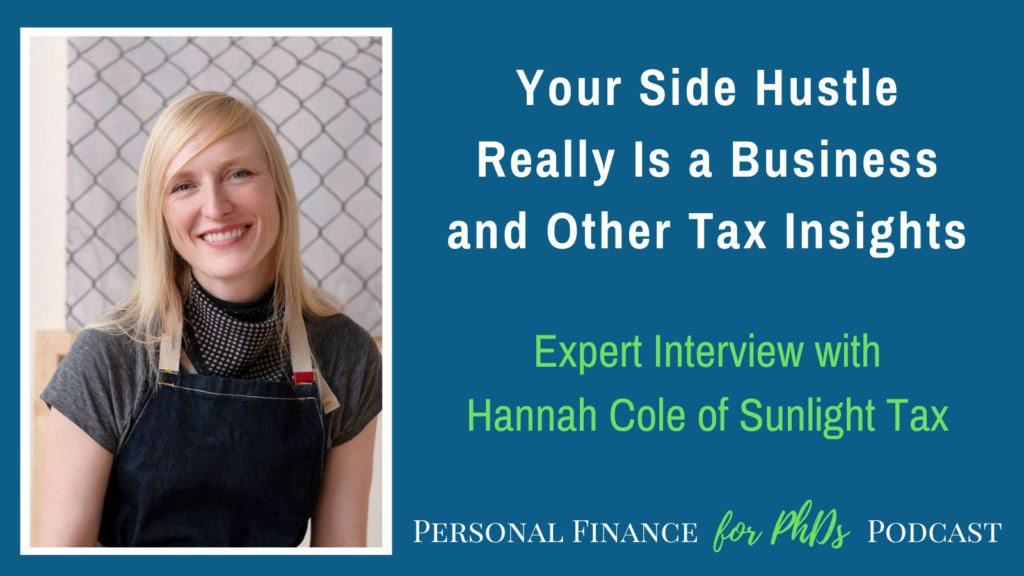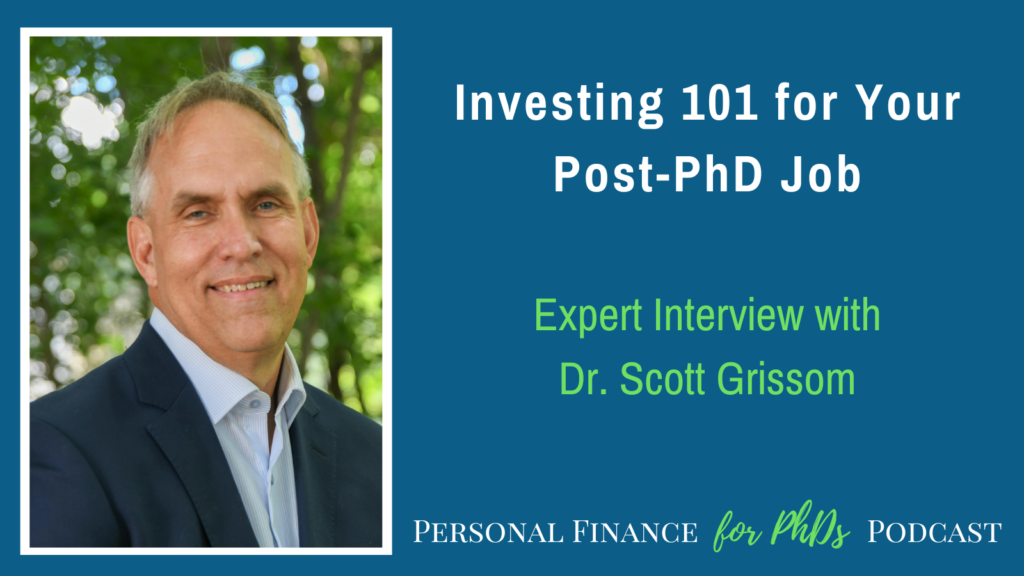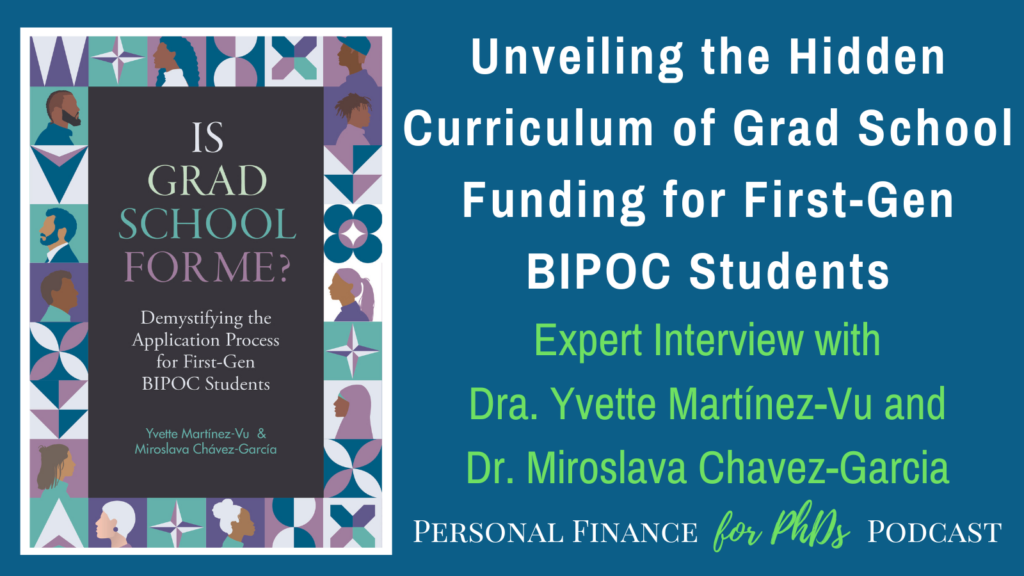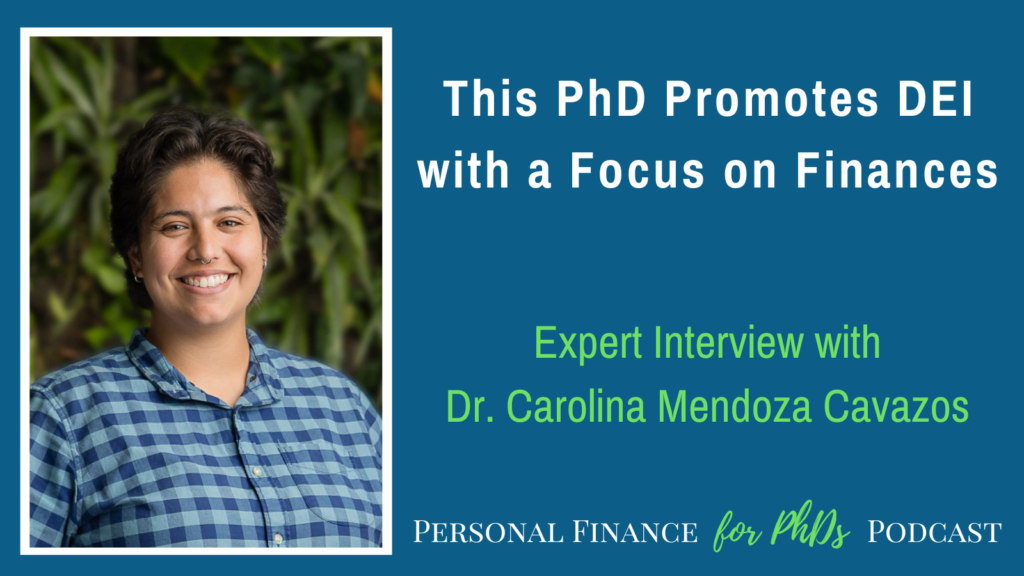In this episode, Emily shares the microinterviews she recorded at three conferences this year. The conference attendees, all of whom either work at universities or have PhDs themselves, responded to this prompt: “What resource on your campus could graduate students and postdocs access to benefit their finances?” You’ll hear the responses in order from the attendees of the National Postdoctoral Association Annual Conference, the Graduate Career Consortium Annual Meeting, and the Higher Education Financial Wellness Summit. You should be able to detect the transitions among the conferences as there are strong themes within each set. As a bonus, listen for a two-time contributor! While these are all real examples from individual universities, you can search for, inquire about, or request similar resources on your campus.
Links mentioned in the Episode
- National Postdoctoral Association Annual Conference
- Graduate Career Consortium Annual Meeting
- Higher Education Financial Wellness Summit
- University of Texas at Arlington Graduate School Website
- Host a PF for PhDs Seminar at Your Institution
- Emily’s E-mail Address
- UNC Charlotte Niner Finances
- PF for PhDs Subscribe to Mailing List
- PF for PhDs Podcast Hub
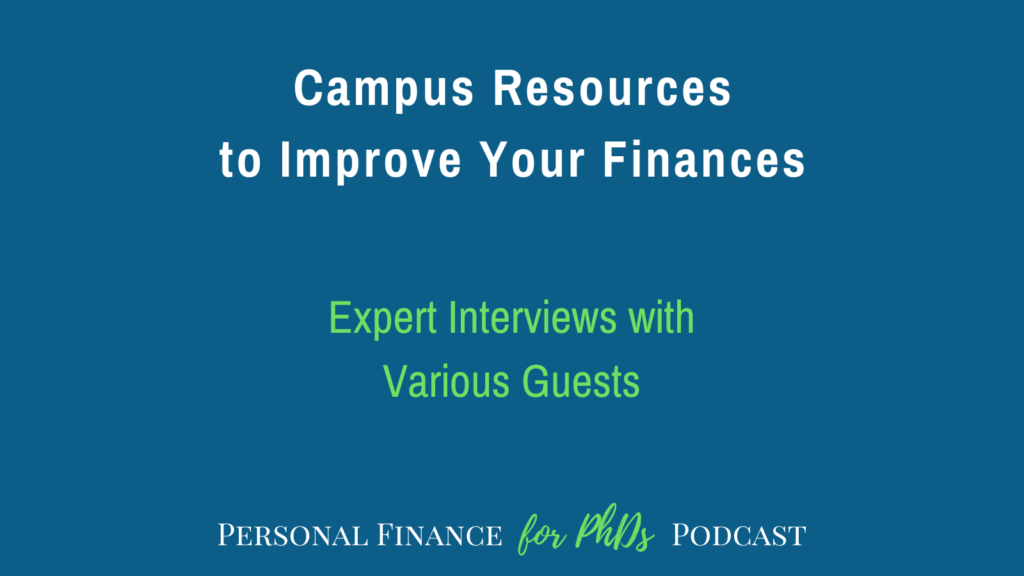
Teaser
Tharangi F (00:00): Our Gamecock Community Shop, which is our basic needs school supply closet. It does food meals, it does clothing, um, basic needs of any type, like hygiene, and I think that really does help our graduate student population and they’re actively using it.
Introduction
Emily (00:24): Welcome to the Personal Finance for PhDs Podcast: A Higher Education in Personal Finance. This podcast is for PhDs and PhDs-to-be who want to explore the hidden curriculum of finances to learn the best practices for money management, career advancement, and advocacy for yourself and others. I’m your host, Dr. Emily Roberts, a financial educator specializing in early-career PhDs and founder of Personal Finance for PhDs.
Emily (00:53): This is Season 21, Episode 5, and today I’m sharing the microinterviews I recorded at three conferences this year. The conference attendees, all of whom either work at universities or have PhDs themselves, responded to this prompt: “What resource on your campus could graduate students and postdocs access to benefit their finances?” You’ll hear the responses in order from the attendees of the National Postdoctoral Association Annual Conference, the Graduate Career Consortium Annual Meeting, and the Higher Education Financial Wellness Summit. I think you’ll be able to detect the transitions among the conferences as there are strong themes within each set. As a bonus, listen for a two-time contributor! While these are all real examples from individual universities, you can search for, inquire about, or request similar resources on your campus.
Emily (01:52): At the start of every academic year, fellowship recipients need to know that if they are not having income tax withheld from their paychecks, they should start self-withholding and possibly make a payment by September 15th. Otherwise, they are in for a nasty surprise when they file their tax returns next spring. If your university is not providing adequate messaging and resources regarding estimated tax, would you please recommend me as a workshop facilitator? I offer both live and asynchronous versions of a workshop that guides US citizens and residents in filling out the Estimated Tax Worksheet in IRS Form 1040-ES and managing their money to seamlessly meet their tax obligations. These workshops are typically considered professional development or personal wellness. I would very much appreciate you cc’ing me when you recommend me so I can follow up with additional information for the potential host. Thank you very much! You can find the show notes for this episode at PFforPhDs.com/s21e5/. Without further ado, here’s my compilation episode on financially beneficial resources for graduate students and postdocs.
Harvard Medical School: Credit Union, Financial Advising, & EAP
Jim G (03:22): I am Jim Gould, director for Postdoc Affairs at Harvard Medical School, and a resource our postdocs could use to help with their finances are, are a couple that we have a, a credit union at Harvard that they could use for banking and, and credit cards and savings, as well as, uh, a retirement benefits like TIAA CREF offers financial advising. We also have an employee assistance program that our postdocs and many of our, um, employees could actually use for finances and many other things.
Oklahoma Medical Research Foundation: EAP
Joel S (03:48): My name is Joel Solís. I’m with the Oklahoma Medical Research Foundation with our HR team as an HR associate. And I think one of the resources that is highly beneficial to everyone at our foundation is our employee assistance program. Where basically the employee has the ability to contact, um, uh, free, uh, assistance when it comes to health, uh, uh, mental health or even financial, um, awareness or legal assistance. Um, it’s basically six free counseling sessions that occur every year, and it’s not only open to them, but also to their families. Um, and like I said, it’s something that renews every year.
George Washington University: 401K/403B Retirement Match & TIAA CREF/Fidelity Partnerships
Ruchi G (04:26): My name is Ruchi Gupta and I work with George Washington University, and I think we have the benefit of having the 401k and 40- 403B, um, with my university and the university matches 1.5 times of that. So that’s a good benefit. Uh, and the university invests have the partnership with the fidelity and the TIAA, and you can either choose or they choose on your behalf. They help you with that. Uh, and not many people are aware of that, and they kind of lose on that benefit. So I think it’s a good idea to be aware and take advantage of the resources available to you.
Penn State: TIAA CREF Consultant
Jennifer N (05:03): Jennifer Nicholas, director of Postdoctoral Affairs at Penn State, and my answer is the TIAA CREF consultant because postdocs could benefit from more mindful planning of how they would save for retirement at this stage of life, and they can often use those services for free, um, because those services are available to those who work at Penn State.
University of Michigan: TIAA CREF/Fidelity Wealth Managers
Mark M (05:27): Hi, I’m Mark Moldwin, the director of the Office of Postdoc Affairs at University of Michigan. And the resource I would recommend is that they would contact, uh, either TIAA, CREF or Fidelity, the two financial service providers for their 403B. Uh, so they would have a, uh, wealth manager help set up, uh, their goals for investing in retirement and get them thinking about, um, how valuable it is to start early.
Massachusetts Institute of Technology: Communication Lab & Teaching + Learning Lab
Alex Y (06:01): My name is Alex Yen. My pronouns are she, her, hers. I am the program director for postdoc Career Advising and Professional Development at MIT, so Massachusetts Institute of Technology. So in terms of resources on my campus that I always encourage my postdocs to know more about and use are services outside of my own office that really emphasize written and verbal communication, which are skills that they can take with them even after they leave MIT. For us, that’s the communication lab. That’s their writing and communication center. That’s the Teaching + Learning Lab. And I encourage postdocs to go and see where can I learn how to improve that grant application I’m putting in? How do I refine the data and the graphs that I’m putting on slides? Is there some type of teaching certificate that postdocs can, um, can get? So that’s what I encourage. Go find those other resources beyond just your career resource center and also your office of Postdoc Services.
University of Michigan Medical School: Therapists
Michele S (07:05): Hi, Michele Swanson, director of Postdoc Office at University of Michigan Medical School. I’m very proud that our Office of Graduate Postdoctoral Studies now has two licensed therapists, counselors, um, who are available to meet with our pred docs and our postdocs for up to six sessions at no cost confidential to describe any kind of personal or work related challenge. And then they can introduce them to resources in the community if they, if longer term, uh, relationship is important.
University of Michigan: Centralized Shared Services
Kaylee S (07:35): My name is Kaylee Steen. I work at the University of Michigan. I’m the Associate Director of Professional Development and Trainee Support, and I would say one of our resources on campus is our centralized shared services. So if you have expenses and you need reimbursement, it’s all a one stop shop to submit a ticket to make sure you get all your money back.
Massachusetts Institute of Technology: Welcome Session
Bettina (07:54): I’m Bettina, I’m a postdoc at MIT, at the Brain and Cognitive Sciences Department, and, um, I happen to be a current president of the PDA and, um, resources on campus. I think looking back into three years of being in a postdoc at MIT I think the resources are there. It’s just that the point in time when you have the bandwidth to access them is way too late because we have the community at MIT is incredibly international, and when you change countries, con- continents, social spheres in starting a postdoc, it’s just too much to adjust to to spend. Any thoughts on your 401k and now looking back? I wish I had the bandwidth back then because I, I’m aware now at I lost money, but also I’m aware now that I’m out in a year, so it’s not even worth putting in the effort anymore, which is unfortunate. What I’m recommending everyone I meet now being a new postdoc is take the welcome session when you, when you arrive, and then take them again six months in because the info out there, it’s just a matter of how much you can digest at a time.
Massachusetts Institute of Technology: 401K and Reimbursement Resources
Expery O (09:04): My name is Expery Omollo. I’m a postdoc fellow at MIT. There are a few things that, uh, a few resources on campus that can benefit postdocs at MIT. One of them is the benefits, uh, and to be specific, the 401k, I feel like it’s very useful for postdocs to be educated on the power of compounding interest. Um, I feel like most people tend to wait until they get a real job before they start investing, and in that time, they’re wasting five years is enough to, let’s say, make a few thousand dollars that they didn’t know about. Um, so that’ll be one thing. Another thing is, um, there are other aspects of saving money when it comes to transit. For example, MIT has a free, uh, transit across Boston to use the public transit system. Uh, if you use your bike to go to campus every day, you can get reimbursed. Um, if you, the MIT health, if you go to the gym, you can apply to get reimbursement from the health provider as well. And most people don’t know this, but this is a free 150 to $300. Um, and another thing is they do have a pension. But it’s very hidden and there’s a lot of, uh, it’s so hard to find that information. But MIT offers it. I think there’s a, you have to be at MIT for limited for some time before you can apply for it. But it’s somewhere there. I saw it recently. And, um, maybe as Bettina was saying, having all of this information during orientation may be the solution and maybe reiterating it over time through email or, you know, in other postdoc meetings, just mentioning it so that people can know about all of it.
Medical University of South Carolina: Library Rental System
Lyndsay Y (11:04): Hi, I’m Lyndsay Young. I’m a postdoctoral fellow at the Medical University of South Carolina. And I think a resource that, um, our postdocs need to know about is actually our library rental system. So you can rent laptops, speakers, uh, projectors, screens, anything technology-wise from our library that for a certain amount of time it’s for free and you can utilize that for your own personal benefit, for your events, for anything really that is that you wanna do. So I think it’s a really underutilized resource that our people should be more knowledgeable about.
Argonne National Lab: HR Resources
Evelyna W (11:38): Hi, uh, my name is Evelyna Wang . I’m a postdoc at Argonne National Lab, and our HR department actually provides a lot of good resources about personal financing and benefits that are available to postdocs. However, I think postdocs need to access and attend some of these seminars and really gain the information that’s being shared with them.
Salk Institute for Biological Studies: Financial Advisors
B. Bea R (12:01): Morning, my name is B. Bea Rajsombath from the Salk Institute for Biological Studies, and I think our postdocs need to take advantage of the onsite financial advisors to schedule one-on-one appointments, so they have access to, to that in understanding how to invest their portfolio.
Massachusetts Institute of Technology: 401K App
Alex Y (12:19): Hello everyone. My name is Alex Yen pronouns, she, her and I am the Career Advising and Professional Development Program Director at MIT Massachusetts Institute of Technology. So the resource that I really like, and I do think this is a resource many, many postdocs I work with postdocs have, is if you have a, if you have a 401k with your university, you should download whatever app that is associated with. So for MIT, that’s fidelity, and there you can actually plan out and do projections of what would it look like, say if you put aside the certain amount of money and they can project, what will that look like to get to your retirement goal? So look at that. It’s nice graphs, it’s nice numbers and data, and I really, really like this resource for helping you understand why it might be helpful for you to put money into a 401k
Fidelity Student Programs
Emily (13:19): Emily here. Adding on Fidelity actually has amazing financial education resources around investing. They have a special program for college students, but it’s rolled out at certain campuses, and I’m guessing it’s also available to graduate students. Not sure about the postdoc side of things, but please check that out if you have access to it.
Villanova: Lifelong Career Resources and Services
Casey H (13:37): Hi, my name’s Casey Hilferty. I’m Associate Director for Career Management at Villanova University. Um, one thing that we would love to remind our grad students of is that we offer lifelong career resources and services, um, including lifelong career appointments. So they don’t need to contract a career coach. If they ever need one, they can always return back to Villanova.
University of Texas at Arlington: Fellowships, Grants, and I-Engage Mentoring Program
Leah C (14:01): My name’s Leah Collum. I’m the program manager for graduate student Academic and professional development at the University of Texas at Arlington. And on our campus, we have several resources that graduate students should be aware of. We have, uh, dissertation fellowships, we have travel grants, we have writing group grants. We have the I-Engage mentoring program, which offers a stipend and all kinds of other internal funding opportunities, um, that graduate students should be aware of, and they can find them all on our website, which is uta.edu/gradschool.
UNC Chapel Hill: Impact Internship Program
Patrick B (14:36): My name’s Patrick Brandt, and I’m the director of Career Development and Science Outreach at UNC Chapel Hill. So one of the programs that I run is called the Impact Internship Program, and it’s a short term internship, uh, local to the RTP or to the triangle area of North Carolina. And it gives the UNC grad students a chance to be able to do an internship and gain some, um, some hands-on skill, uh, development so that they can be more competitive as a candidate, uh, for whatever career they’re interested in.
Georgia Tech: Campus Closet
Megan E (15:09): My name’s Megan Elrath and I’m a online Career Services manager at Georgia Tech. And a resource on our campus that grad students or postdocs should know about that would help their finances is our campus closet, where students can access professional attire for interviewing, um, presentations, maybe even to defend their dissertations or proposals so that they can have that professional look and feel confident when they go into those high pressure settings.
Commercial
Emily (15:35): Emily here for a brief interlude. Would you like to learn directly from me on a personal finance topic, such as taxes, goal-setting, investing, frugality, increasing income, or student loans, each tailored specifically for graduate students and postdocs? I offer seminars and workshops on these topics and more in a variety of formats, and I’m now booking for the 2025-2026 academic year. If you would like to bring my content to your institution, would you please recommend me as a speaker or facilitator to your university, graduate school, graduate student association, medical school, postdoc office, or postdoc association? My workshops are usually slated as professional development or personal wellness. Orientations, postdoc appreciation week, or close to the start of the academic year would be a perfect time for tax education or general personal finance content. Ask the potential host to go to PFforPhDs.com/financial-education/ or simply email me at [email protected] to start the process. I really appreciate these recommendations, which are the best way for me to start a conversation with a potential host. The paid work I do with universities and institutions enables me to keep producing this podcast and all my other free resources. Thank you in advance if you decide to issue a recommendation! Now back to our interview.
George Washington University: Alumni Network
Autumn A (17:12): My name is Autumn Anthony and I serve as the Assistant Director of Graduate Postdoc Affairs at George Washington University. And one way that we’ve been investing in financial success and career development for our students is within the presidential fellowship, um, which I have the privilege of directing, and it’s a small group, so hopefully in the future we can expand this out to more students. But we’ve been tapping into our alumni network and finding those individuals who have established careers, um, in managing your financial portfolio. And we’ve been able to set up some really great, um, mini seminars and workshops where these folks will come and, and present on how to make the most of your finances and set yourself up for success. And it’s been low cost so far. So that’s something that, um, I would recommend people tapping into their alumni network.
UT Southwestern: Internships
Leah B (18:06): My name is Leah Banks and I’m the director of Graduate career, uh, development at UT Southwestern in Dallas, Texas. Uh, and a resource that I feel would be really helpful for grad students and post-docs, um, is, um, having the opportunity to do internships. And so we recently were able to change the policy in which would allow for them to do research internships. Um, before that they were only able to do consulting venture capital type internships, but this allows for them to really build out their toolkit to tap into those resources outside of UT Southwestern to, um, be more exposed to, um, technical type internships that could really help them to be more, um, marketable when they, you know, leave grad school and their postdocs.
University of Michigan: Career Services and Clothes Closet
Maggie G (18:59): My name is Maggie Gardner. I’m the Senior program manager for STEM Professional Development in the Rackham Graduate School at the University of Michigan. Generally speaking, resources that I believe grad students and postdocs should take advantage of while they’re at Michigan that would help them financially are broadly our career services, but more specifically taking advantage of cv, resume, cover letter review, interview preparation, negotiation workshops. All of these are available to them free of charge while they’re at the University of Michigan. And these are services that they’ll have to pay for, um, if they choose to, to seek them out outside of the university. Um, so these are long-term very beneficial to their financial wellbeing. Um, we also have a clothes closet at the University Career Center that graduate students can take advantage of. Uh, they’re allowed to pick out, I think, two items per semester for interviews or networking events, whatever it is that need, they need professional attire for. Uh, we also have a, um, a food pantry that students are eligible or able to take advantage of. Um, they can stop by every day, every week, whatever it is they need, you know, when they need just a little bit of extra help to, to get by and to, to sustain themselves.
University of Buffalo: Internship Equity Fund
Gina B (20:25): Hi, this is Gina Bellavia, graduate career design consultant at the University of Buffalo. And one thing that would help graduate students improve their finances that we offer is our internship equity fund. So if you were to get an internship that was unpaid, uh, and with either a government agency or a nonprofit organization, you could apply to be paid through through this fund. And usually we have it available each semester and then in the summer as well.
Vanderbilt: Beyond the Lab Podcast
Aubrie S (20:53): Hi, my name is Aubrie Stricker. I am a part of the Vanderbilt Biomedical Career Development Office. And the resource that I think our campus provides for our students is the Beyond the Lab podcast, where it provides informational interviews to give our trainees insights as to how the, uh, alumni got to the positions that they’re in and along the way, they share their career advice, including the financial advice they may have to help the trainees get to where they want to be.
University of Illinois Urbana-Champaign: Campus Web Store
Derek A (21:19): I’m Derek Attig, Assistant Dean for Career and Professional Development in the graduate college at the University of Illinois, Urbana Champaign. And a resource on our campus that I, I think grad students and postdocs could take advantage of that could improve their finances is the campus web store, which has a wide variety of free or, uh, reduce costs software, uh, to, you know, support your work, help you develop new skills, right? And often people don’t know it’s there.
Boston University: PF for PhDs Podcast and Campus Workshops
Béné (21:50): Hi everyone. My name is Béné. I am the Director of Professional Development at Boston University in the Graduate School of Medical Sciences. And I think a resource that has been very inspiring for me is your podcast, Emily, because you’ve been able to actually meet with postdocs who having the same financial constraints as what I had as a postdoc were still able to really think their finances through, we’re able to decide, okay, this is how much I want to invest, this is how much I want to learn about investing. Um, and they’ve stuck with our goals and they were able to actually achieve things that they wouldn’t have without having done so. So I’m looking forward to having you on my campus to talk with our students and helping them really take a step back and make set important financial and budgeting goals.
University of Minnesota: Student Legal Services
Amelia C (22:34): Hi, my name’s Amelia Casas. I’m a one-stop counselor at the University of Minnesota. And one resource to look for on your campus is student Legal Services for help with any sort of renters disputes, immigration, things like that. It’s like having a personal lawyer on retainer for the cost of your tuition and fees.
UC Berkeley: Center for Financial Wellness
Anne X (22:59): Hi, my name is Anne Xiong. I manage the Center for Financial Wellness at UC Berkeley. Um, so the resources I want to introduce to our grad students are actually the Center for Financial Wellness. I encourage all grad students at uc, Berkeley to advantage of this free service. Go to our website, we have online resources, and then we have our peer coaching and workshops.
UNC Chapel Hill: Carolina Cupboard and Bus Passes
Sara L (23:23): My name is Sara Lorenzen. I’m the Assistant Director of Financial Wellbeing at the University of North Carolina at Chapel Hill. Um, and a resource on our campus, um, that I think a lot of students don’t know about is we have a food pantry network, um, called the Carolina Cupboard, um, which is four food pantries on campus that are available, but also, um, UNC students get and employees get a free bus pass through our bus system. And the Chapel Hill Bus system is free to everyone in Chapel Hill. So I think people don’t utilize that nearly enough to save money.
University of South Carolina: Gamecock Community Shop
Tharangi F (23:59): Hi, my name is Tharangi Fernando. I’m the peer consultant manager for the Student Success Center at the University of South Carolina. Our Gamecock community shop, which is our basic needs, um, like school supply closet, it does food meals, it does clothing, um, basic needs of any type like hygiene, and I think that really does help our graduate student population and they’re actively using it.
University of Chicago: Webinars
Emmy (24:21): I’m Emmy, I’m the Communications Manager at the Office of Bursar at the University of Chicago. Our main resource that would definitely be a benefit to our grad students and postdocs would be our webinars. Um, we offer a webinar series for new students, including grad students, and over the course of the year, we offer a ton of webinars that educate on financial wellness in general, but also just the services that our office provides.
University of Utah: International Student and Scholar Services
Katie D (24:46): Hi, my name is Katie DeSau. I am the case manager for the International Student and Scholar Services on the University of Utah campus. Um, my job is to connect students to campus services and the resources that we have for grad students and postdocs, especially international students, would be the International Student and Scholar Services or the IS office. And you can come talk to me about any problem that you have, uh, financial or otherwise, and I can help coordinate contact with, uh, campus resources, especially Financial Wellness Center, where they have options for credit counseling, one-on-one counseling, budgeting, and also finding other financial resources for you. Um, you can also come to me to get connected to the basic needs, uh, collective. Um, they’re all about basic needs. We also have a Feed you pantry. Um, so there are resources that you’re already paying for in your student fees, so please come see us and get help.
New York University: Stern Graduate Financial Aid Office Website
Tina B (25:45): Tina Bird, I’m the Assistant Director of the Stern Graduate Financial Aid Office at NYU. Um, and, uh, some of the great resources that we have is our website. Um, we have a lot of information on our website about, uh, external scholarship sources, um, teaching our graduate fellowships, um, and, you know, veteran assistance. Uh, so yeah, our, our website is specifically designed to help out our students.
University of Missouri: VITA Program
Alex E (26:11): My name is Alex Embree and I’m the interim manager at the Office for Financial Success at the University of Missouri in many communities and on many campuses, uh, there will be a VITA IRS tax resource where students can receive free tax preparation in addition to some tax education, so they can learn about how their, uh, assistantships or how their other funding sources are taxed and can make more, um, knowledgeable decisions about how they’re preparing for their tax burden, um, or how they’re saving for that, how they’re, um, establishing their financial security around their funding sources. And I’ll just add these VITA clinics are for both citizens, residents, and non-residents, depending on the certifications of the people involved. So don’t think it’s not for you if you’re an international student.
UNC Charlotte: Niner Finances
Nicole B (26:57): Hi, I am Nicole Benford. I’m the director of Niner Finances at UNC Charlotte. And to answer the question, what resource on your campus could grad students or postdocs access to improve their finances? I would say that’s my office. Uh, we offer workshops, presentations, and one-on-one coaching, and we also have self-study material on our website at NinerFinances.charlotte.edu. Um, but we are happy to help.
Oregon State University: Student Legal Services
Rebekah H (27:23): Hi, uh, I’m Rebekah Hahn and I’m a graduate assistant at the Oregon State University Basic Needs Center. We have a student legal services team, um, and they’re able to provide free legal services on a variety of issues. Um, I actually completed my divorce, transferred a house, and, uh, made new advanced directives with them all at no cost. And legal services are extremely expensive, so I think that all schools should have something like this.
University of Tennessee Knoxville: Financial Wellness Coaches
Philippa S (27:53): Hi, I’m Philippa Satterwhite. I am the coordinator, uh, for the Center of Financial Wellness at the University of Tennessee. Knoxville. And my answer to be, to make an appointment with, uh, our financial wellness coaches, a one-on-one appointment. Every student can make one. It’s free where we can sit down and help you think of through like your cost, but balancing of budget, thinking about life after grad school, thinking about, uh, you know, the job search. So all those things that we do at a one-on-one counseling, you can make as many appointments as you want. As many if few or as many, um, you’re there to help.
Washington University in St. Louis: Emergency Assistance Fund, Grad School Prep Funds, and iGrad
Andrea S-D (28:24): Hi there, I’m Andrea Stewart-Douglas, director of Financial Wellbeing at Washington University in St. Louis. The resources on my campus to help graduate students, um, we actually have a fund that provides emergency assistance to graduate students. Um, we also have funding available to undergraduate students who are looking to go on to graduate school. So we support their studies for things like the mcat, the lsat, the GRE. We will provide funding to help them purchase their study materials, to cover their test exams, to even cover their fees, um, as they’re applying. We’re also supporting them by providing them with funding. If they do a visit, if they are interviewing at the school and need to travel to that college or university will provide the funding to purchase their plane ticket, cover their hotel fees. We also, um, have a online platform called iGrad, and that’s available to not only graduate undergraduate students, but our graduate students as well. And so we’re encouraging all graduate students to check that platform out. It has tons of great information, uh, for budgeting, uh, planning for retirement, if they’re interested in buying a home. Um, there’s great information on that. So it’s a really, really, uh, robust resource, uh, articles, um, courses, videos, um, pretty much every way of uh, or mode of, um, learning is available on that platform. So, um, we’re also available in our office to provide one-on-one support if students want to come in and just talk about their situation, maybe sit down with us to do a little goal setting. And we’re gonna do our best to provide whatever support we can. And if we can’t do this internally, we have places people that we can connect them to outside of the university as well.
UNC Chapel Hill: Carolina Financial Wellbeing Center
Gilbert R (30:23): My name is Gilbert Rogers. I’m the Director of Financial Wellbeing at UNC Chapel Hill. One resource that I’ll highlight is the Carolina Financial Wellbeing Center. We are a fairly new resource to campus where graduate and professional students, uh, can come and ask questions about personal finance. We can get them connected to outside of the community resources that can help them increase their overall financial knowledge or, uh, get help with, uh, specific situations that graduate students need support with.
University of Oregon: Financial Literacy Workshops
Tennille W (30:52): So my name’s Tennille Wait. I’m the assistant director at the Financial Wellness Center at the University of Oregon. Um, the resources that we have for grad students, uh, recently what we’ve had happen is one of our grad students reached out, uh, to find financial literacy information. So they got hooked up with me. Um, from that we have put together a whole series, or I should say a three part series of workshops for specifically for grad students, um, kind of based around financial literacy, budgeting, um, learning how to make, what their financial aid they’re receiving work for what they’re doing. Um, there’s gonna be a tax component on making sure that they understand any tax implications with the funding that they’re receiving. Um, and then we are also working with, um, you know, other, other campus partners to just make sure that, uh, if they have travel expenses and things like that, how to make sure that all of those things, um, how they impact their financial aid, but then also how to budget for those and make sure that it’s fitting into their financial plan.
Outro
Emily (32:09): Listeners, thank you for joining me for this episode! I have a gift for you! You know that final question I ask of all my guests regarding their best financial advice? My team has collected short summaries of all the answers ever given on the podcast into a document that is updated with each new episode release. You can gain access to it by registering for my mailing list at PFforPhDs.com/advice/. Would you like to access transcripts or videos of each episode? I link the show notes for each episode from PFforPhDs.com/podcast/. See you in the next episode, and remember: You don’t have to have a PhD to succeed with personal finance… but it helps! Nothing you hear on this podcast should be taken as financial, tax, or legal advice for any individual. The music is “Stages of Awakening” by Podington Bear from the Free Music Archive and is shared under CC by NC. Podcast editing by me and show notes creation by Dr. Jill Hoffman.
